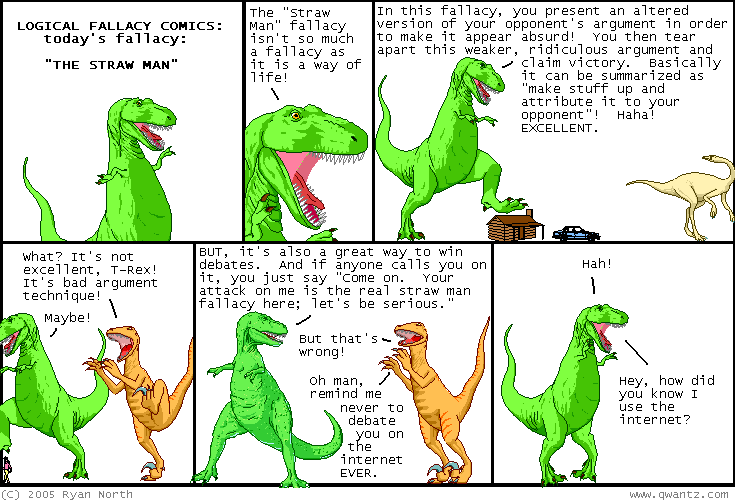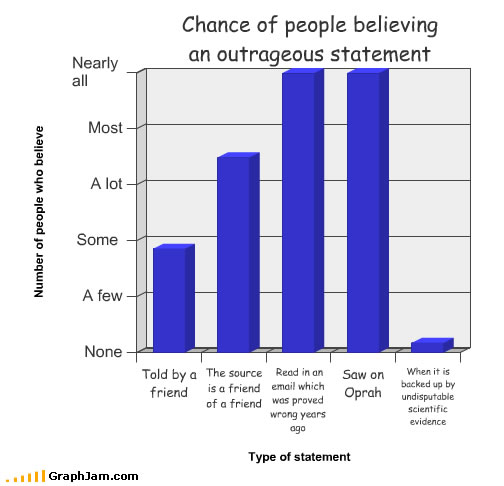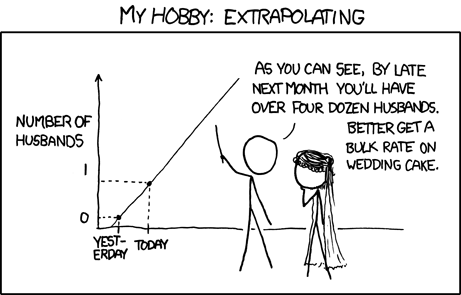Showing posts with label cultural detritus. Show all posts
Showing posts with label cultural detritus. Show all posts
Thursday, December 17, 2009
Sunday, December 13, 2009
As Usual, The Onion Nails It
New Device Desirable, Old Device Undesirable
"The new device is an improvement over the old device, making it more attractive for purchase by all Americans," said Thomas Wakefield, a spokesperson for the large conglomerate that manufactures the new device. "The old device is no longer sufficient. Consumers should no longer have any use or longing for the old device." (more...)

"The new device is an improvement over the old device, making it more attractive for purchase by all Americans," said Thomas Wakefield, a spokesperson for the large conglomerate that manufactures the new device. "The old device is no longer sufficient. Consumers should no longer have any use or longing for the old device." (more...)

Saturday, December 12, 2009
I Approve This Dishonesty
What do you get when you take the intellectual dishonesty of politicians and combine it with the intellectually dishonesty of advertising? A work of distorted art:
Monday, December 7, 2009
Homework #3
Homework #3 is due at the beginning of class on Monday, December 14th. Your assignment is to choose an ad (on TV or from a magazine or wherever) and evaluate it from a logic & reasoning perspective.
- First, very briefly explain the argument that the ad offers to sell its product.
- Then, list and explain the mistakes in reasoning that the ad commits.
- Then, list and explain the psychological ploys the ad uses (what psychological impediments does the ad try to exploit?).
- Attach (if it's from a newspaper) or briefly explain the ad.
Sunday, December 6, 2009
Wooden-Headed
Here's a little rant on that favorite topic of mine: intellectual honesty. A simple goal of this class is to get us all to recognize what counts as good evidence and what counts as bad evidence for a claim. I think we're getting better at that. But this doesn't guarantee that we'll care about the difference once we figure it out.
Getting us to care is the real goal of this class. We should care about good evidence. We should care about evidence and arguments because they get us closer to the truth. When we judge an argument to be overall good, THE POWER OF LOGIC COMPELS US to believe the conclusion. If we are presented with decent evidence for some claim, but still stubbornly disagree with this claim, we are just being irrational. Worse, we're effectively saying that the truth doesn't matter to us.
This means we should be open-minded. We should be willing to challenge ourselves, and let new evidence change our current beliefs. We should be open to the possibility that we've currently gotten something wrong. This is how comedian Todd Glass puts it:
Here are the first two paragraphs of a great article I read last year on this:

Getting us to care is the real goal of this class. We should care about good evidence. We should care about evidence and arguments because they get us closer to the truth. When we judge an argument to be overall good, THE POWER OF LOGIC COMPELS US to believe the conclusion. If we are presented with decent evidence for some claim, but still stubbornly disagree with this claim, we are just being irrational. Worse, we're effectively saying that the truth doesn't matter to us.
This means we should be open-minded. We should be willing to challenge ourselves, and let new evidence change our current beliefs. We should be open to the possibility that we've currently gotten something wrong. This is how comedian Todd Glass puts it:
Here are the first two paragraphs of a great article I read last year on this:
Ironically, having extreme confidence in oneself is often a sign of ignorance. Remember, in many cases, such stubborn certainty is unwarranted.Last week, I jokingly asked a health club acquaintance whether he would change his mind about his choice for president if presented with sufficient facts that contradicted his present beliefs. He responded with utter confidence. "Absolutely not," he said. "No new facts will change my mind because I know that these facts are correct."
I was floored. In his brief rebuttal, he blindly demonstrated overconfidence in his own ideas and the inability to consider how new facts might alter a presently cherished opinion. Worse, he seemed unaware of how irrational his response might appear to others. It's clear, I thought, that carefully constructed arguments and presentation of irrefutable evidence will not change this man's mind.

Tuesday, December 1, 2009
Wished Pots Never Boil
Here is a hodgepodge of links on some psychological impediments we're discussing recently:

- If you're a fan of The Secret, you should beware that it's basic message is wishful thinking run amok.
- Teachers have biases, too: we're self-serving and play favorites.
- Why don't we give more aid to those in need? Psychological impediments are at least partly to blame.
- Why do we believe medical myths (like "vitamin C cures the common cold," or "you should drink 8 glasses of water a day")? Psychological impediments, of course!

Wednesday, November 18, 2009
Filling in Memory
Here's a section (pages 78-80) from psychologist Dan Gilbert's great book Stumbling on Happiness about how memory works:
The preview cuts off at the bottom of page 80. Here's the rest from that section:
Fine. Here's Dan Gilbert on The Colbert Report:
The preview cuts off at the bottom of page 80. Here's the rest from that section:
"...reading the words you saw. But in this case, your brain was tricked by the fact that the gist word--the key word, the essential word--was not actually on the list. When your brain rewove the tapestry of your experience, it mistakenly included a word that was implied by the gist but that had not actually appeared, just as volunteers in the previous study mistakenly included a stop sign that was implied by the question they had been asked but that had not actually appeared in the slides they saw.Too many words, Sean! Can't you just put up a video? You better make it funny, too!
"This experiment has ben done dozens of times with dozens of different word lists, and these studies have revealed two surprising findings. First, people do not vaguely recall seeing the gist word and they do not simply guess that they saw the gist word. Rather, they vividly remember seeing it and they feel completely confident that it appeared. Second, this phenomenon happens even when people are warned about it beforehand. Knowing that a researcher is trying to trick you into falsely recalling the appearance of a gist word does not stop that false recollection from happening."
Fine. Here's Dan Gilbert on The Colbert Report:
Saturday, November 14, 2009
Ask Friends... Old Friends
Here's a case for more deference in our lives from one of my favorite websites:

- Often times, our friends know more about us than we do.
- While talking to your friends, you might want to ask more about them. It turns out that they're less like us than we might think.
- Also, consider listening to advice from older people. We're not as different from them as we think.

Labels:
authority,
cultural detritus,
link,
owning it
Friday, November 13, 2009
Monday, November 9, 2009
An Expert for Every Cause
Looking for links on appealing to authority? This is your post! First, here's an interesting article on a great question: How are non-specialists supposed to figure out the truth about stuff that requires expertise?
Not all alleged experts are actual experts. Here's a method to tell which experts are phonies (this article was originally published in the Chronicle of Higher Education).
It's important to check whether the person making an appeal to authority really knows who the authority is. That's why we should beware of claims that begin with "Studies show..."
And here's a Saturday Night Live sketch in which Christopher Walken completely flunks the competence test.
Not all alleged experts are actual experts. Here's a method to tell which experts are phonies (this article was originally published in the Chronicle of Higher Education).
It's important to check whether the person making an appeal to authority really knows who the authority is. That's why we should beware of claims that begin with "Studies show..."
And here's a Saturday Night Live sketch in which Christopher Walken completely flunks the competence test.
Labels:
authority,
cultural detritus,
fallacies,
link,
video
Saturday, November 7, 2009
Wednesday, November 4, 2009
Begging the Dinosaur
 I couldn't resist giving you some stuff on begging the question. Here's my favorite video for Mims's logically delicious song "This is Why I'm Hot":
I couldn't resist giving you some stuff on begging the question. Here's my favorite video for Mims's logically delicious song "This is Why I'm Hot":
Labels:
as discussed in class,
cultural detritus,
fallacies,
video
Sunday, November 1, 2009
Let's Be Diplomatic: Straw Person

Here's some stuff on the straw man fallacy:
- Politicians love to distort their opponents' positions. Even Obama does it.
- Politicians aren't alone: we do it, too. Often we distort arguments for claims we disagree with without even realizing it. This is because we have trouble coming up with good reasons supporting a conclusion that we think is false, so we have a tendency to make up bad reasons and attribute them to our opponents.
- Hire your own professional straw man!
Wait, we weren't just speaking of red her--Oh. I see what you did there.
Clever.
Labels:
cultural detritus,
fallacies,
link,
more cats? calm down sean
Tuesday, October 20, 2009
That's an Ad Hominem, Jerk
 Here's some links on the ad hominem (personal attack) fallacy:
Here's some links on the ad hominem (personal attack) fallacy:- Sure, some critics of Obama are racist, but does that mean we can dismiss their arguments? As much as we might want to, logically, no we cannot!
- Some variants on the personal attack: tu quoque (hypocrite!) and guilt by association (she hangs around bad people!).
- I should note that tu quoque isn't always fallacious reasoning.
- "The ad hominem rejoinders—ready the ad hominem rejoinders!"
- Remember our rallying cry: "STUPID PEOPLE SOMETIMES SAY SMART THINGS."
Labels:
as discussed in class,
cultural detritus,
fallacies,
link,
video
Sunday, October 18, 2009
Take My Wife, As Amphiboly
Here's some stand up from Henny Youngman, the violin-toting comedian who came up with "Take my wife... please!"
Labels:
as discussed in class,
cultural detritus,
fallacies,
video
Tuesday, September 29, 2009
Learning From Experience
Here's some stuff on inductive arguments. First, a video of comedian Lewis Black describing his failure to learn from experience every year around Halloween:
Next, a stick figure comic offers a pretty bad argument. Why is it bad? (Let us know in the comments!)
There's another stick-figure comic about scientists' efforts to get as big a sample size as they can to improve their arguments.
Finally, some more thoughtful links.
Next, a stick figure comic offers a pretty bad argument. Why is it bad? (Let us know in the comments!)
There's another stick-figure comic about scientists' efforts to get as big a sample size as they can to improve their arguments.
Finally, some more thoughtful links.
- What are the benefits and dangers of generalizations?
- What makes stereotyping illogical?
- Beware: we often make snap judgments before thinking through things. Then when we do think through things, we just wind up rationalizing our snap judgments.
Labels:
comment whoring,
cultural detritus,
inductive,
video
Sunday, September 6, 2009
Extra Credit: Tiffany's Argument
Just a reminder that the extra credit is to figure out the argument from Tiffany's big hit:
What part is the conclusion? Which parts are the premises? Be sure to give me your reasons why you got the answer you got. The extra credit is due at the beginning of class on Wednesday.
What part is the conclusion? Which parts are the premises? Be sure to give me your reasons why you got the answer you got. The extra credit is due at the beginning of class on Wednesday.
Labels:
as discussed in class,
assignment,
cultural detritus,
video
Subscribe to:
Posts (Atom)


